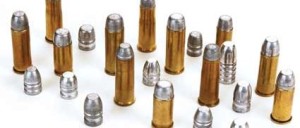Lead has long been the material of choice for
ammunition production. The reason for lead’s wide adoption and use in
ammunition is due to the cheap availability of the metal as well as its
advantageous physical properties. Such physical properties of lead that
have made it universally acceptable as a metal of choice for ammunition
include: it is soft, malleable, ductile, easy to harvest, and has a low
melting temperature. Other
fields of use for lead include hospitals in which it is used as x-ray
shields, portable batteries, in addition to other uses. Lead truly is a
versatile material because of these physical properties.
Despite
these advantages, lead is nevertheless a toxic material and has been
ranked number two on the U.S. EPA list of hazardous materials.
Unfortunately, only recently are we fully understanding the many health risks regarding lead exposure, which include lead poisoning
and a number of health illnesses and ailments. As a result of this
newfound understanding of the health risks posed by lead, companies
which manufacture or process lead are now being forced to take extreme
measures to limit lead exposure and minimize the health risks of such,
all at great cost. Beyond human health risks, lead also causes
environmental hazards in that it is not easily degradable plus is also
contaminates soil and water. This is why there is the need for lead free ammunition.
many health risks regarding lead exposure, which include lead poisoning
and a number of health illnesses and ailments. As a result of this
newfound understanding of the health risks posed by lead, companies
which manufacture or process lead are now being forced to take extreme
measures to limit lead exposure and minimize the health risks of such,
all at great cost. Beyond human health risks, lead also causes
environmental hazards in that it is not easily degradable plus is also
contaminates soil and water. This is why there is the need for lead free ammunition.
 many health risks regarding lead exposure, which include lead poisoning
and a number of health illnesses and ailments. As a result of this
newfound understanding of the health risks posed by lead, companies
which manufacture or process lead are now being forced to take extreme
measures to limit lead exposure and minimize the health risks of such,
all at great cost. Beyond human health risks, lead also causes
environmental hazards in that it is not easily degradable plus is also
contaminates soil and water. This is why there is the need for lead free ammunition.
many health risks regarding lead exposure, which include lead poisoning
and a number of health illnesses and ailments. As a result of this
newfound understanding of the health risks posed by lead, companies
which manufacture or process lead are now being forced to take extreme
measures to limit lead exposure and minimize the health risks of such,
all at great cost. Beyond human health risks, lead also causes
environmental hazards in that it is not easily degradable plus is also
contaminates soil and water. This is why there is the need for lead free ammunition.
The
risks posed by lead in the form of bullets or ammunition are also
evident during use when firing a weapon with lead based ammo. This
occurs because the discharge of the round releases airborne lead which
contaminates the air supply, a particularly severe issue for indoor
ranges. There is also the issue of discharged rounds which at ranges can
pile up and damage soil and water, and which also pose health risks to
the employees charged with cleaning them up. These factors and more are
responsible for the push and increased demand for lead-free ammunition.
In other words, a bullet that performs identically to a lead round but
without any toxic constituents.
There are a
variety of types of lead free ammunition in the marketplace today. Most
of these lead alternatives are produced from a composite material, such
as a metal composite like tin and copper, or a polymer composite of
plastic and metal powders known as a thermoplastic composite material.
The most unfortunate thing about lead is its cheap cost which prevents
faster adoption of these alternatives, but the market for a lead
substitute otherwise known as green ammo is growing.
What can be used as lead substitute?
There
are a few different lead substitutes however one of the more
outstanding materials in this respect is tungsten. Tungsten is often
used as a lead substitute due to the fact that it is even denser than
lead. However, one issue is that the higher melting temperature of
tungsten as compared to lead makes it harder and more costly for it to
be molded and processed.
Factors that make lead substitutes better than lead ammunition.
Another noteworthy aspect of some lead free ammunition is that they are complete ly
frangible, meaning they powderize upon impact and don’t ricochet like
their lead counterparts, making them particularly useful for
close-quarters combat. Lead substitutes as noted turn into powder when
they collide with a hard object preventing issues of ricocheting and
otherwise stray bullets hitting unwanted targets. Additionally lead
substitutes don’t contaminate kills or hunting grounds for game hunters.
ly
frangible, meaning they powderize upon impact and don’t ricochet like
their lead counterparts, making them particularly useful for
close-quarters combat. Lead substitutes as noted turn into powder when
they collide with a hard object preventing issues of ricocheting and
otherwise stray bullets hitting unwanted targets. Additionally lead
substitutes don’t contaminate kills or hunting grounds for game hunters.
 ly
frangible, meaning they powderize upon impact and don’t ricochet like
their lead counterparts, making them particularly useful for
close-quarters combat. Lead substitutes as noted turn into powder when
they collide with a hard object preventing issues of ricocheting and
otherwise stray bullets hitting unwanted targets. Additionally lead
substitutes don’t contaminate kills or hunting grounds for game hunters.
ly
frangible, meaning they powderize upon impact and don’t ricochet like
their lead counterparts, making them particularly useful for
close-quarters combat. Lead substitutes as noted turn into powder when
they collide with a hard object preventing issues of ricocheting and
otherwise stray bullets hitting unwanted targets. Additionally lead
substitutes don’t contaminate kills or hunting grounds for game hunters.
Lead substitutes
can be produced in a variety of calibers including 5.56mm, 9mm, 40 cal
and 40mm DBR, and are readily available in Walmart, Cabela’s as well as
the Academy. Lead free ammunition will forge forward towards a future of
ammunition innovation.






0 comments:
Post a Comment